Financial Reporting Analysis: M&S, IAS, IFRS, and Global Differences
VerifiedAdded on 2020/10/05
|12
|3969
|327
Report
AI Summary
This report provides a detailed analysis of financial reporting, covering its definition, purposes, and the key principles of the regulatory and conceptual framework. It identifies the main stakeholders of an organization, such as Marks and Spencer Group Plc, and explains how they benefit from financial data. The report explores the value of financial reporting in meeting organizational growth and objectives. It explains International Accounting Standards (IAS) and International Financial Reporting Standards (IFRS) and their benefits. The report critically evaluates the financial reporting of Marks and Spencer Group Plc, applying relevant theories and models to support judgments and conclusions. It also identifies differences in financial reporting across the world and evaluates the factors influencing these differences, including degrees of compliance with IFRS by different organizations globally. The report concludes by summarizing the key findings and providing references for further study.
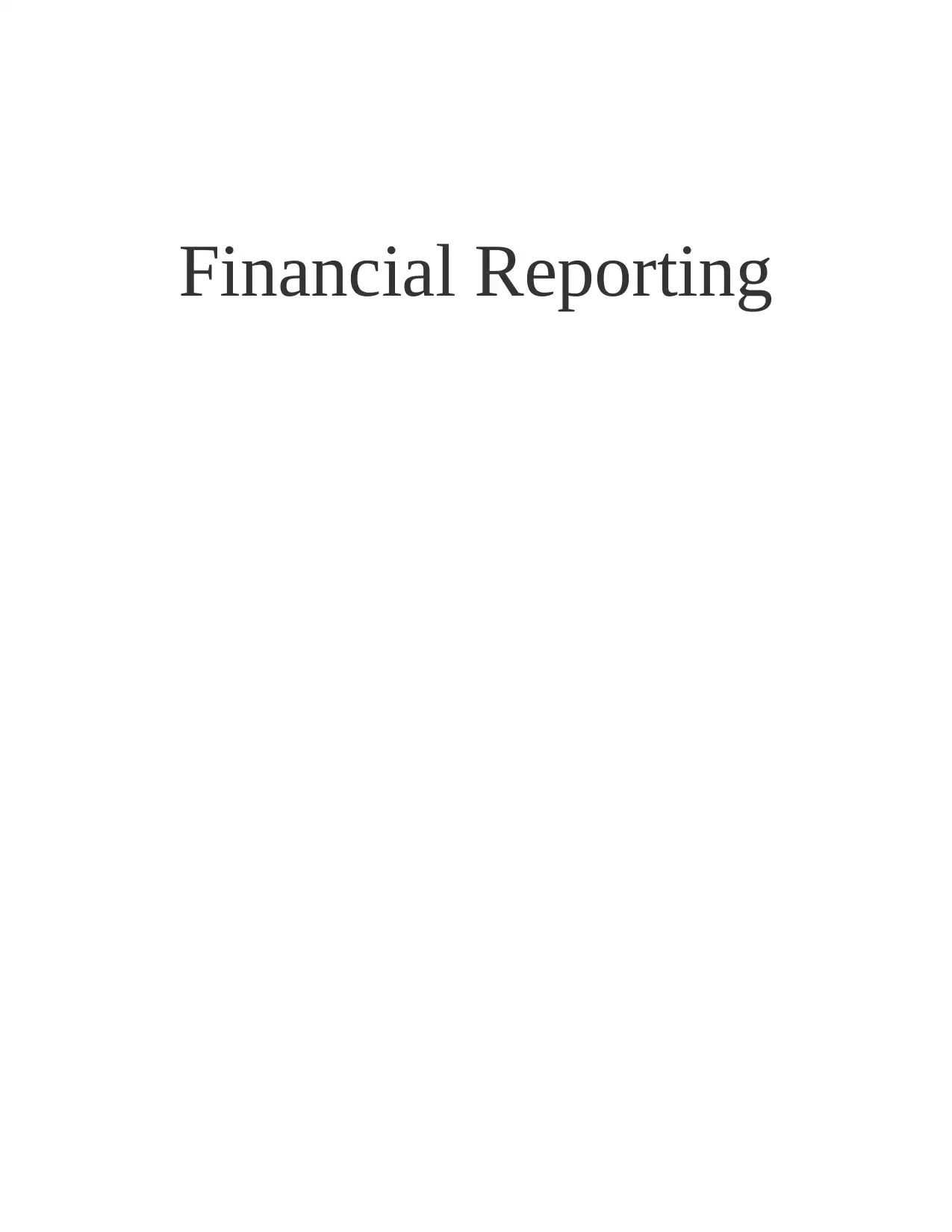
Financial Reporting
Paraphrase This Document
Need a fresh take? Get an instant paraphrase of this document with our AI Paraphraser
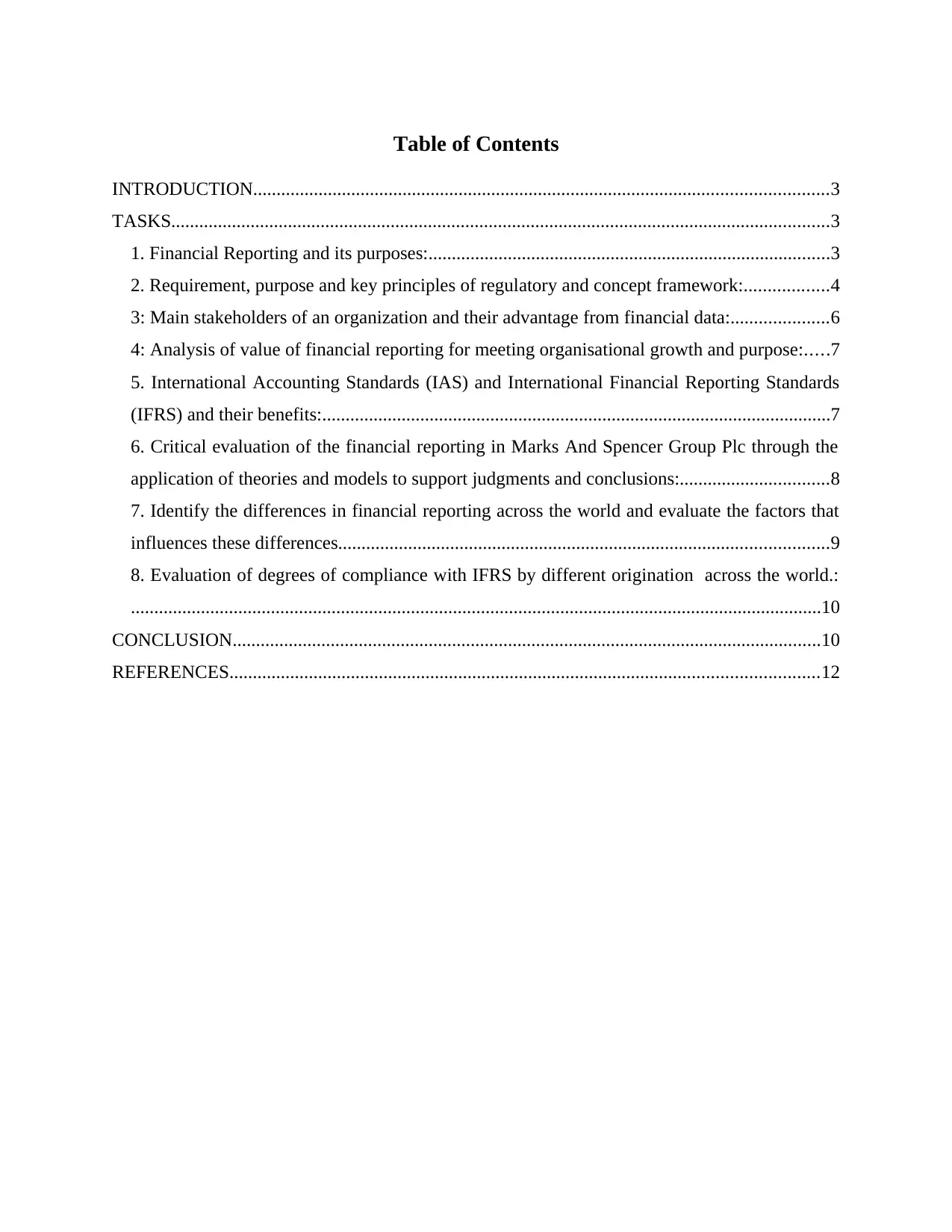
Table of Contents
INTRODUCTION...........................................................................................................................3
TASKS.............................................................................................................................................3
1. Financial Reporting and its purposes:......................................................................................3
2. Requirement, purpose and key principles of regulatory and concept framework:..................4
3: Main stakeholders of an organization and their advantage from financial data:.....................6
4: Analysis of value of financial reporting for meeting organisational growth and purpose:.....7
5. International Accounting Standards (IAS) and International Financial Reporting Standards
(IFRS) and their benefits:.............................................................................................................7
6. Critical evaluation of the financial reporting in Marks And Spencer Group Plc through the
application of theories and models to support judgments and conclusions:................................8
7. Identify the differences in financial reporting across the world and evaluate the factors that
influences these differences.........................................................................................................9
8. Evaluation of degrees of compliance with IFRS by different origination across the world.:
....................................................................................................................................................10
CONCLUSION..............................................................................................................................10
REFERENCES..............................................................................................................................12
INTRODUCTION...........................................................................................................................3
TASKS.............................................................................................................................................3
1. Financial Reporting and its purposes:......................................................................................3
2. Requirement, purpose and key principles of regulatory and concept framework:..................4
3: Main stakeholders of an organization and their advantage from financial data:.....................6
4: Analysis of value of financial reporting for meeting organisational growth and purpose:.....7
5. International Accounting Standards (IAS) and International Financial Reporting Standards
(IFRS) and their benefits:.............................................................................................................7
6. Critical evaluation of the financial reporting in Marks And Spencer Group Plc through the
application of theories and models to support judgments and conclusions:................................8
7. Identify the differences in financial reporting across the world and evaluate the factors that
influences these differences.........................................................................................................9
8. Evaluation of degrees of compliance with IFRS by different origination across the world.:
....................................................................................................................................................10
CONCLUSION..............................................................................................................................10
REFERENCES..............................................................................................................................12
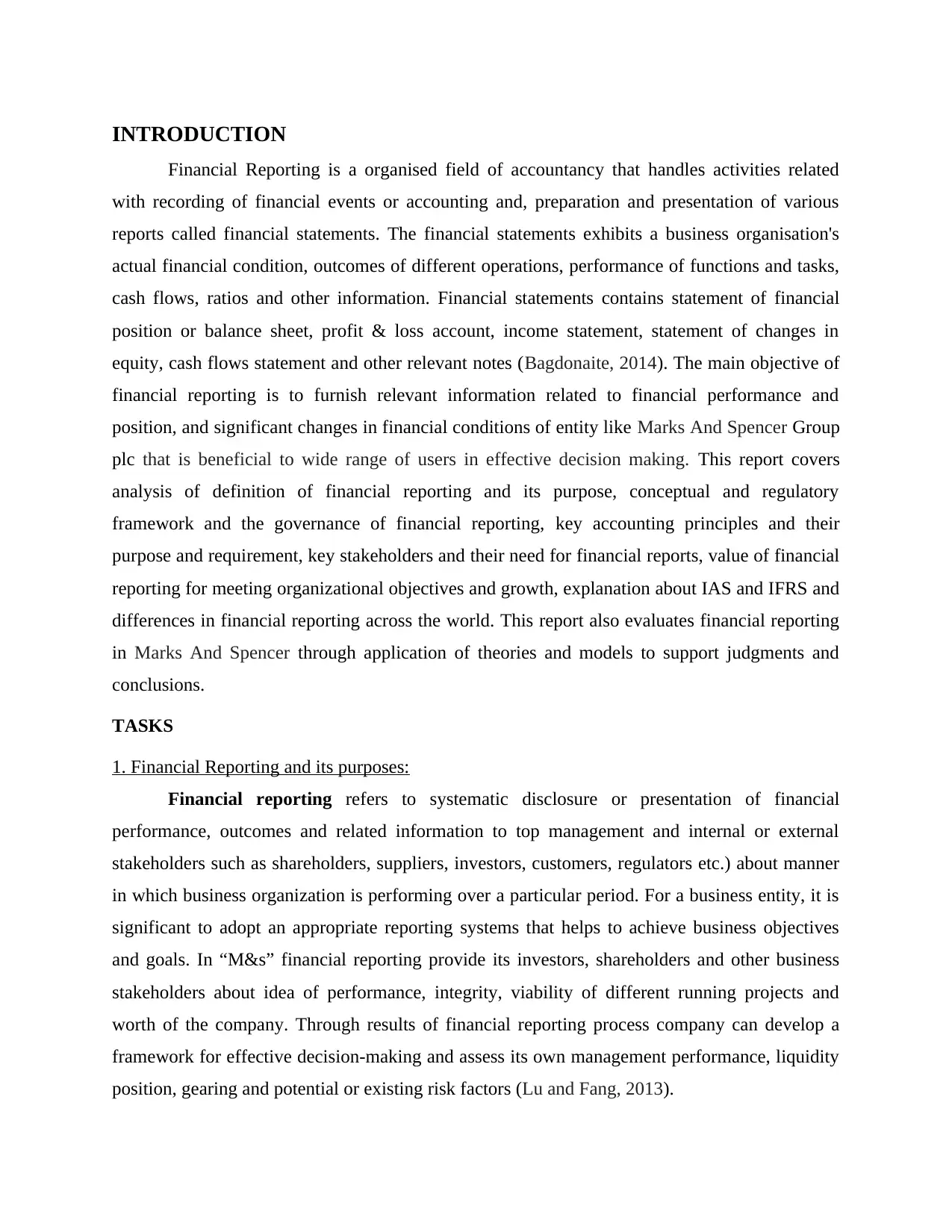
INTRODUCTION
Financial Reporting is a organised field of accountancy that handles activities related
with recording of financial events or accounting and, preparation and presentation of various
reports called financial statements. The financial statements exhibits a business organisation's
actual financial condition, outcomes of different operations, performance of functions and tasks,
cash flows, ratios and other information. Financial statements contains statement of financial
position or balance sheet, profit & loss account, income statement, statement of changes in
equity, cash flows statement and other relevant notes (Bagdonaite, 2014). The main objective of
financial reporting is to furnish relevant information related to financial performance and
position, and significant changes in financial conditions of entity like Marks And Spencer Group
plc that is beneficial to wide range of users in effective decision making. This report covers
analysis of definition of financial reporting and its purpose, conceptual and regulatory
framework and the governance of financial reporting, key accounting principles and their
purpose and requirement, key stakeholders and their need for financial reports, value of financial
reporting for meeting organizational objectives and growth, explanation about IAS and IFRS and
differences in financial reporting across the world. This report also evaluates financial reporting
in Marks And Spencer through application of theories and models to support judgments and
conclusions.
TASKS
1. Financial Reporting and its purposes:
Financial reporting refers to systematic disclosure or presentation of financial
performance, outcomes and related information to top management and internal or external
stakeholders such as shareholders, suppliers, investors, customers, regulators etc.) about manner
in which business organization is performing over a particular period. For a business entity, it is
significant to adopt an appropriate reporting systems that helps to achieve business objectives
and goals. In “M&s” financial reporting provide its investors, shareholders and other business
stakeholders about idea of performance, integrity, viability of different running projects and
worth of the company. Through results of financial reporting process company can develop a
framework for effective decision-making and assess its own management performance, liquidity
position, gearing and potential or existing risk factors (Lu and Fang, 2013).
Financial Reporting is a organised field of accountancy that handles activities related
with recording of financial events or accounting and, preparation and presentation of various
reports called financial statements. The financial statements exhibits a business organisation's
actual financial condition, outcomes of different operations, performance of functions and tasks,
cash flows, ratios and other information. Financial statements contains statement of financial
position or balance sheet, profit & loss account, income statement, statement of changes in
equity, cash flows statement and other relevant notes (Bagdonaite, 2014). The main objective of
financial reporting is to furnish relevant information related to financial performance and
position, and significant changes in financial conditions of entity like Marks And Spencer Group
plc that is beneficial to wide range of users in effective decision making. This report covers
analysis of definition of financial reporting and its purpose, conceptual and regulatory
framework and the governance of financial reporting, key accounting principles and their
purpose and requirement, key stakeholders and their need for financial reports, value of financial
reporting for meeting organizational objectives and growth, explanation about IAS and IFRS and
differences in financial reporting across the world. This report also evaluates financial reporting
in Marks And Spencer through application of theories and models to support judgments and
conclusions.
TASKS
1. Financial Reporting and its purposes:
Financial reporting refers to systematic disclosure or presentation of financial
performance, outcomes and related information to top management and internal or external
stakeholders such as shareholders, suppliers, investors, customers, regulators etc.) about manner
in which business organization is performing over a particular period. For a business entity, it is
significant to adopt an appropriate reporting systems that helps to achieve business objectives
and goals. In “M&s” financial reporting provide its investors, shareholders and other business
stakeholders about idea of performance, integrity, viability of different running projects and
worth of the company. Through results of financial reporting process company can develop a
framework for effective decision-making and assess its own management performance, liquidity
position, gearing and potential or existing risk factors (Lu and Fang, 2013).
⊘ This is a preview!⊘
Do you want full access?
Subscribe today to unlock all pages.

Trusted by 1+ million students worldwide
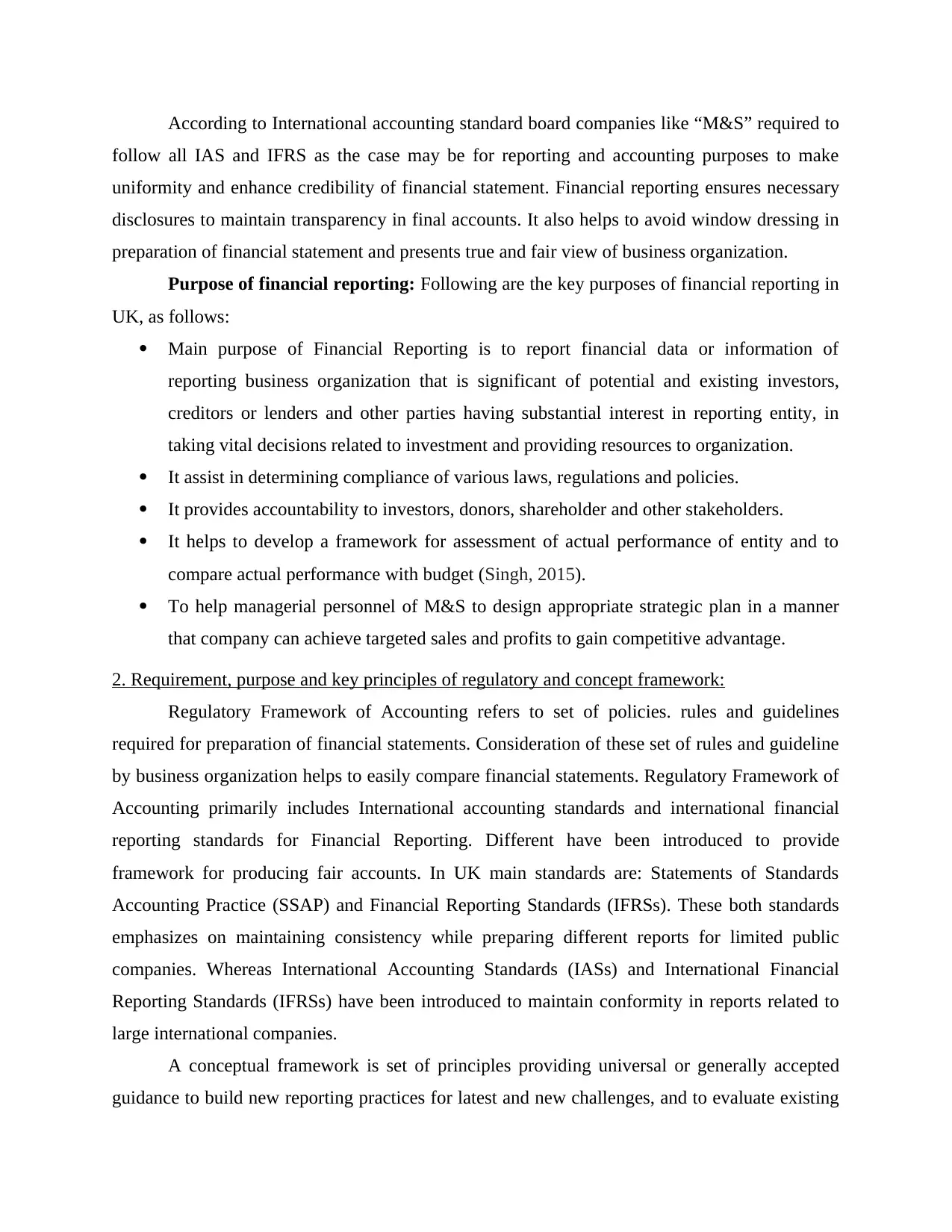
According to International accounting standard board companies like “M&S” required to
follow all IAS and IFRS as the case may be for reporting and accounting purposes to make
uniformity and enhance credibility of financial statement. Financial reporting ensures necessary
disclosures to maintain transparency in final accounts. It also helps to avoid window dressing in
preparation of financial statement and presents true and fair view of business organization.
Purpose of financial reporting: Following are the key purposes of financial reporting in
UK, as follows:
Main purpose of Financial Reporting is to report financial data or information of
reporting business organization that is significant of potential and existing investors,
creditors or lenders and other parties having substantial interest in reporting entity, in
taking vital decisions related to investment and providing resources to organization.
It assist in determining compliance of various laws, regulations and policies.
It provides accountability to investors, donors, shareholder and other stakeholders.
It helps to develop a framework for assessment of actual performance of entity and to
compare actual performance with budget (Singh, 2015).
To help managerial personnel of M&S to design appropriate strategic plan in a manner
that company can achieve targeted sales and profits to gain competitive advantage.
2. Requirement, purpose and key principles of regulatory and concept framework:
Regulatory Framework of Accounting refers to set of policies. rules and guidelines
required for preparation of financial statements. Consideration of these set of rules and guideline
by business organization helps to easily compare financial statements. Regulatory Framework of
Accounting primarily includes International accounting standards and international financial
reporting standards for Financial Reporting. Different have been introduced to provide
framework for producing fair accounts. In UK main standards are: Statements of Standards
Accounting Practice (SSAP) and Financial Reporting Standards (IFRSs). These both standards
emphasizes on maintaining consistency while preparing different reports for limited public
companies. Whereas International Accounting Standards (IASs) and International Financial
Reporting Standards (IFRSs) have been introduced to maintain conformity in reports related to
large international companies.
A conceptual framework is set of principles providing universal or generally accepted
guidance to build new reporting practices for latest and new challenges, and to evaluate existing
follow all IAS and IFRS as the case may be for reporting and accounting purposes to make
uniformity and enhance credibility of financial statement. Financial reporting ensures necessary
disclosures to maintain transparency in final accounts. It also helps to avoid window dressing in
preparation of financial statement and presents true and fair view of business organization.
Purpose of financial reporting: Following are the key purposes of financial reporting in
UK, as follows:
Main purpose of Financial Reporting is to report financial data or information of
reporting business organization that is significant of potential and existing investors,
creditors or lenders and other parties having substantial interest in reporting entity, in
taking vital decisions related to investment and providing resources to organization.
It assist in determining compliance of various laws, regulations and policies.
It provides accountability to investors, donors, shareholder and other stakeholders.
It helps to develop a framework for assessment of actual performance of entity and to
compare actual performance with budget (Singh, 2015).
To help managerial personnel of M&S to design appropriate strategic plan in a manner
that company can achieve targeted sales and profits to gain competitive advantage.
2. Requirement, purpose and key principles of regulatory and concept framework:
Regulatory Framework of Accounting refers to set of policies. rules and guidelines
required for preparation of financial statements. Consideration of these set of rules and guideline
by business organization helps to easily compare financial statements. Regulatory Framework of
Accounting primarily includes International accounting standards and international financial
reporting standards for Financial Reporting. Different have been introduced to provide
framework for producing fair accounts. In UK main standards are: Statements of Standards
Accounting Practice (SSAP) and Financial Reporting Standards (IFRSs). These both standards
emphasizes on maintaining consistency while preparing different reports for limited public
companies. Whereas International Accounting Standards (IASs) and International Financial
Reporting Standards (IFRSs) have been introduced to maintain conformity in reports related to
large international companies.
A conceptual framework is set of principles providing universal or generally accepted
guidance to build new reporting practices for latest and new challenges, and to evaluate existing
Paraphrase This Document
Need a fresh take? Get an instant paraphrase of this document with our AI Paraphraser
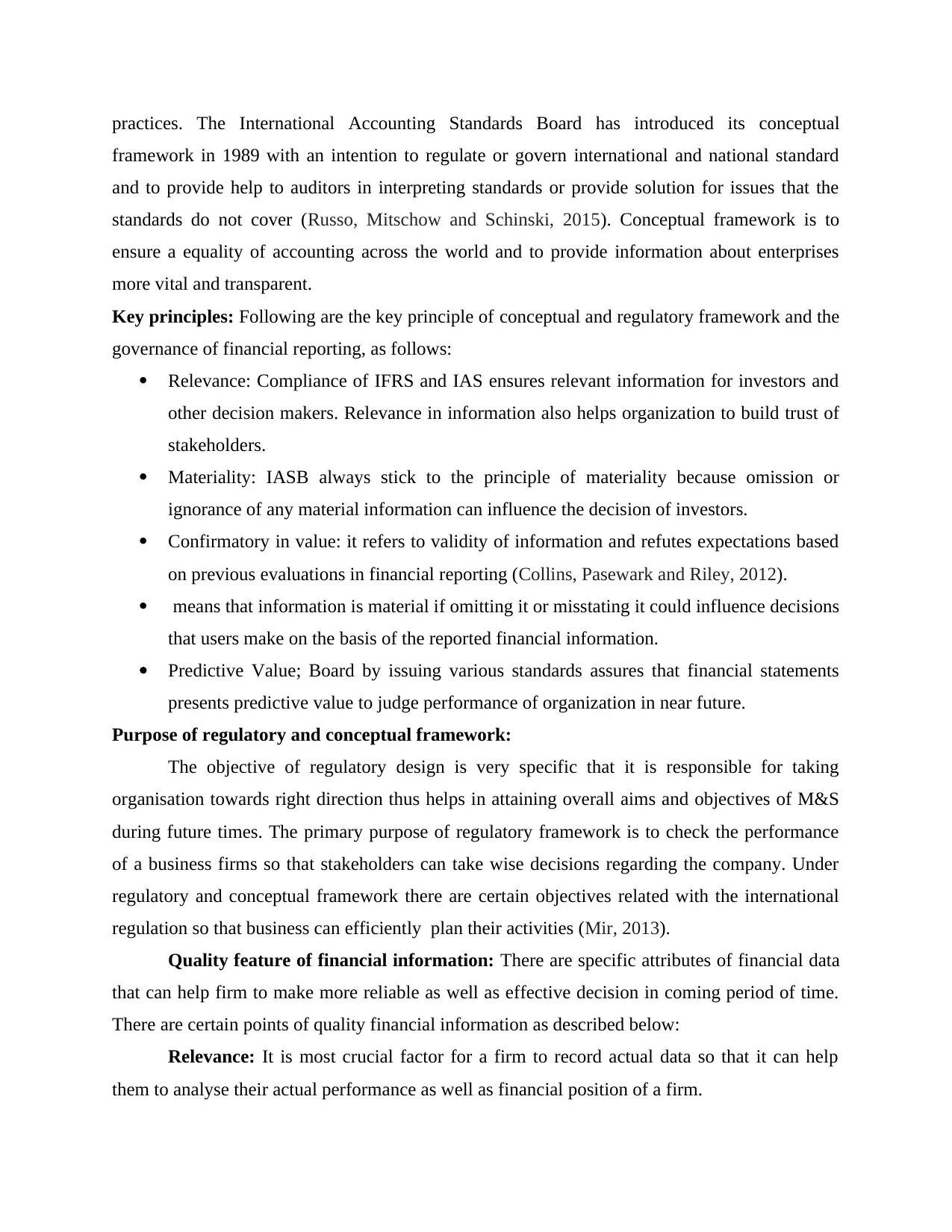
practices. The International Accounting Standards Board has introduced its conceptual
framework in 1989 with an intention to regulate or govern international and national standard
and to provide help to auditors in interpreting standards or provide solution for issues that the
standards do not cover (Russo, Mitschow and Schinski, 2015). Conceptual framework is to
ensure a equality of accounting across the world and to provide information about enterprises
more vital and transparent.
Key principles: Following are the key principle of conceptual and regulatory framework and the
governance of financial reporting, as follows:
Relevance: Compliance of IFRS and IAS ensures relevant information for investors and
other decision makers. Relevance in information also helps organization to build trust of
stakeholders.
Materiality: IASB always stick to the principle of materiality because omission or
ignorance of any material information can influence the decision of investors.
Confirmatory in value: it refers to validity of information and refutes expectations based
on previous evaluations in financial reporting (Collins, Pasewark and Riley, 2012).
means that information is material if omitting it or misstating it could influence decisions
that users make on the basis of the reported financial information.
Predictive Value; Board by issuing various standards assures that financial statements
presents predictive value to judge performance of organization in near future.
Purpose of regulatory and conceptual framework:
The objective of regulatory design is very specific that it is responsible for taking
organisation towards right direction thus helps in attaining overall aims and objectives of M&S
during future times. The primary purpose of regulatory framework is to check the performance
of a business firms so that stakeholders can take wise decisions regarding the company. Under
regulatory and conceptual framework there are certain objectives related with the international
regulation so that business can efficiently plan their activities (Mir, 2013).
Quality feature of financial information: There are specific attributes of financial data
that can help firm to make more reliable as well as effective decision in coming period of time.
There are certain points of quality financial information as described below:
Relevance: It is most crucial factor for a firm to record actual data so that it can help
them to analyse their actual performance as well as financial position of a firm.
framework in 1989 with an intention to regulate or govern international and national standard
and to provide help to auditors in interpreting standards or provide solution for issues that the
standards do not cover (Russo, Mitschow and Schinski, 2015). Conceptual framework is to
ensure a equality of accounting across the world and to provide information about enterprises
more vital and transparent.
Key principles: Following are the key principle of conceptual and regulatory framework and the
governance of financial reporting, as follows:
Relevance: Compliance of IFRS and IAS ensures relevant information for investors and
other decision makers. Relevance in information also helps organization to build trust of
stakeholders.
Materiality: IASB always stick to the principle of materiality because omission or
ignorance of any material information can influence the decision of investors.
Confirmatory in value: it refers to validity of information and refutes expectations based
on previous evaluations in financial reporting (Collins, Pasewark and Riley, 2012).
means that information is material if omitting it or misstating it could influence decisions
that users make on the basis of the reported financial information.
Predictive Value; Board by issuing various standards assures that financial statements
presents predictive value to judge performance of organization in near future.
Purpose of regulatory and conceptual framework:
The objective of regulatory design is very specific that it is responsible for taking
organisation towards right direction thus helps in attaining overall aims and objectives of M&S
during future times. The primary purpose of regulatory framework is to check the performance
of a business firms so that stakeholders can take wise decisions regarding the company. Under
regulatory and conceptual framework there are certain objectives related with the international
regulation so that business can efficiently plan their activities (Mir, 2013).
Quality feature of financial information: There are specific attributes of financial data
that can help firm to make more reliable as well as effective decision in coming period of time.
There are certain points of quality financial information as described below:
Relevance: It is most crucial factor for a firm to record actual data so that it can help
them to analyse their actual performance as well as financial position of a firm.
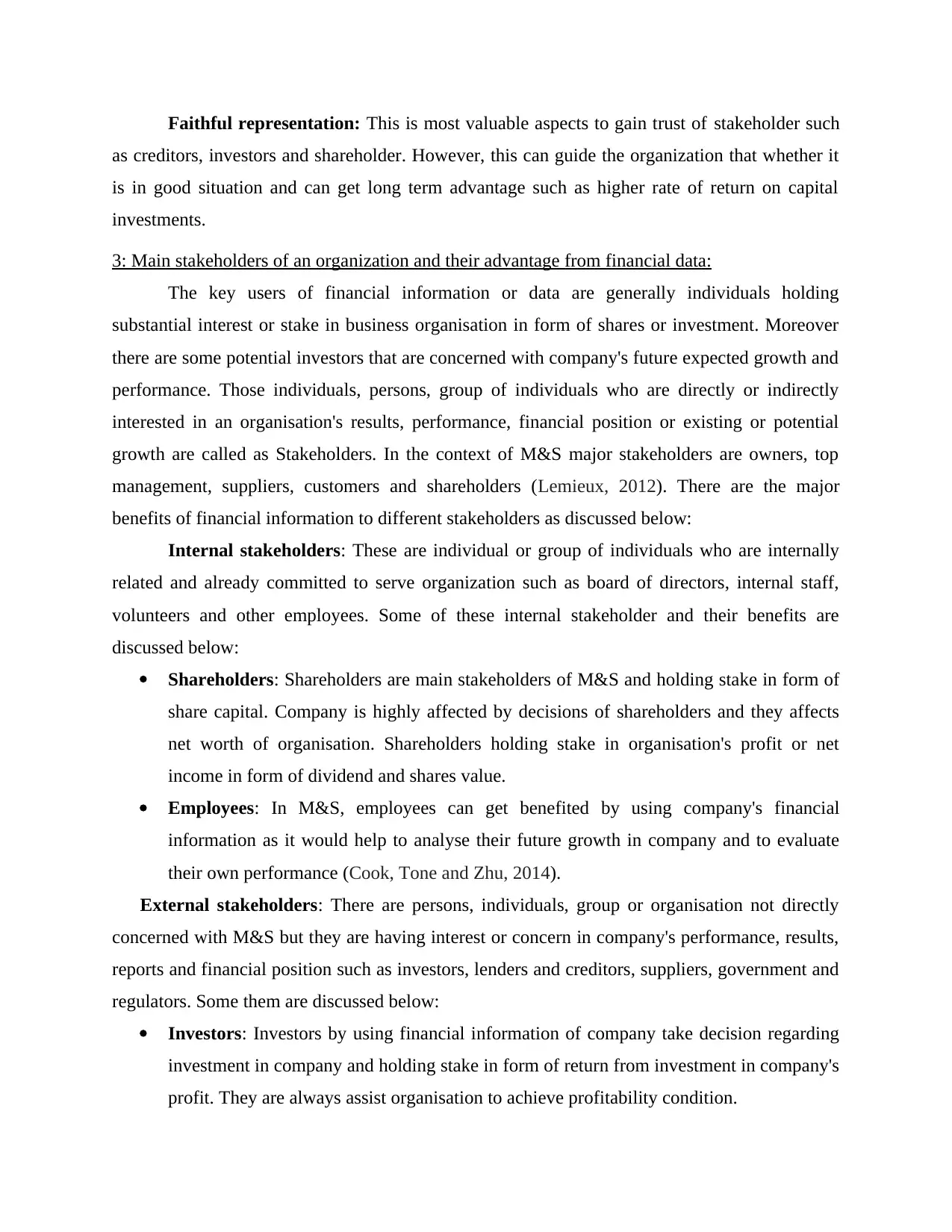
Faithful representation: This is most valuable aspects to gain trust of stakeholder such
as creditors, investors and shareholder. However, this can guide the organization that whether it
is in good situation and can get long term advantage such as higher rate of return on capital
investments.
3: Main stakeholders of an organization and their advantage from financial data:
The key users of financial information or data are generally individuals holding
substantial interest or stake in business organisation in form of shares or investment. Moreover
there are some potential investors that are concerned with company's future expected growth and
performance. Those individuals, persons, group of individuals who are directly or indirectly
interested in an organisation's results, performance, financial position or existing or potential
growth are called as Stakeholders. In the context of M&S major stakeholders are owners, top
management, suppliers, customers and shareholders (Lemieux, 2012). There are the major
benefits of financial information to different stakeholders as discussed below:
Internal stakeholders: These are individual or group of individuals who are internally
related and already committed to serve organization such as board of directors, internal staff,
volunteers and other employees. Some of these internal stakeholder and their benefits are
discussed below:
Shareholders: Shareholders are main stakeholders of M&S and holding stake in form of
share capital. Company is highly affected by decisions of shareholders and they affects
net worth of organisation. Shareholders holding stake in organisation's profit or net
income in form of dividend and shares value.
Employees: In M&S, employees can get benefited by using company's financial
information as it would help to analyse their future growth in company and to evaluate
their own performance (Cook, Tone and Zhu, 2014).
External stakeholders: There are persons, individuals, group or organisation not directly
concerned with M&S but they are having interest or concern in company's performance, results,
reports and financial position such as investors, lenders and creditors, suppliers, government and
regulators. Some them are discussed below:
Investors: Investors by using financial information of company take decision regarding
investment in company and holding stake in form of return from investment in company's
profit. They are always assist organisation to achieve profitability condition.
as creditors, investors and shareholder. However, this can guide the organization that whether it
is in good situation and can get long term advantage such as higher rate of return on capital
investments.
3: Main stakeholders of an organization and their advantage from financial data:
The key users of financial information or data are generally individuals holding
substantial interest or stake in business organisation in form of shares or investment. Moreover
there are some potential investors that are concerned with company's future expected growth and
performance. Those individuals, persons, group of individuals who are directly or indirectly
interested in an organisation's results, performance, financial position or existing or potential
growth are called as Stakeholders. In the context of M&S major stakeholders are owners, top
management, suppliers, customers and shareholders (Lemieux, 2012). There are the major
benefits of financial information to different stakeholders as discussed below:
Internal stakeholders: These are individual or group of individuals who are internally
related and already committed to serve organization such as board of directors, internal staff,
volunteers and other employees. Some of these internal stakeholder and their benefits are
discussed below:
Shareholders: Shareholders are main stakeholders of M&S and holding stake in form of
share capital. Company is highly affected by decisions of shareholders and they affects
net worth of organisation. Shareholders holding stake in organisation's profit or net
income in form of dividend and shares value.
Employees: In M&S, employees can get benefited by using company's financial
information as it would help to analyse their future growth in company and to evaluate
their own performance (Cook, Tone and Zhu, 2014).
External stakeholders: There are persons, individuals, group or organisation not directly
concerned with M&S but they are having interest or concern in company's performance, results,
reports and financial position such as investors, lenders and creditors, suppliers, government and
regulators. Some them are discussed below:
Investors: Investors by using financial information of company take decision regarding
investment in company and holding stake in form of return from investment in company's
profit. They are always assist organisation to achieve profitability condition.
⊘ This is a preview!⊘
Do you want full access?
Subscribe today to unlock all pages.

Trusted by 1+ million students worldwide
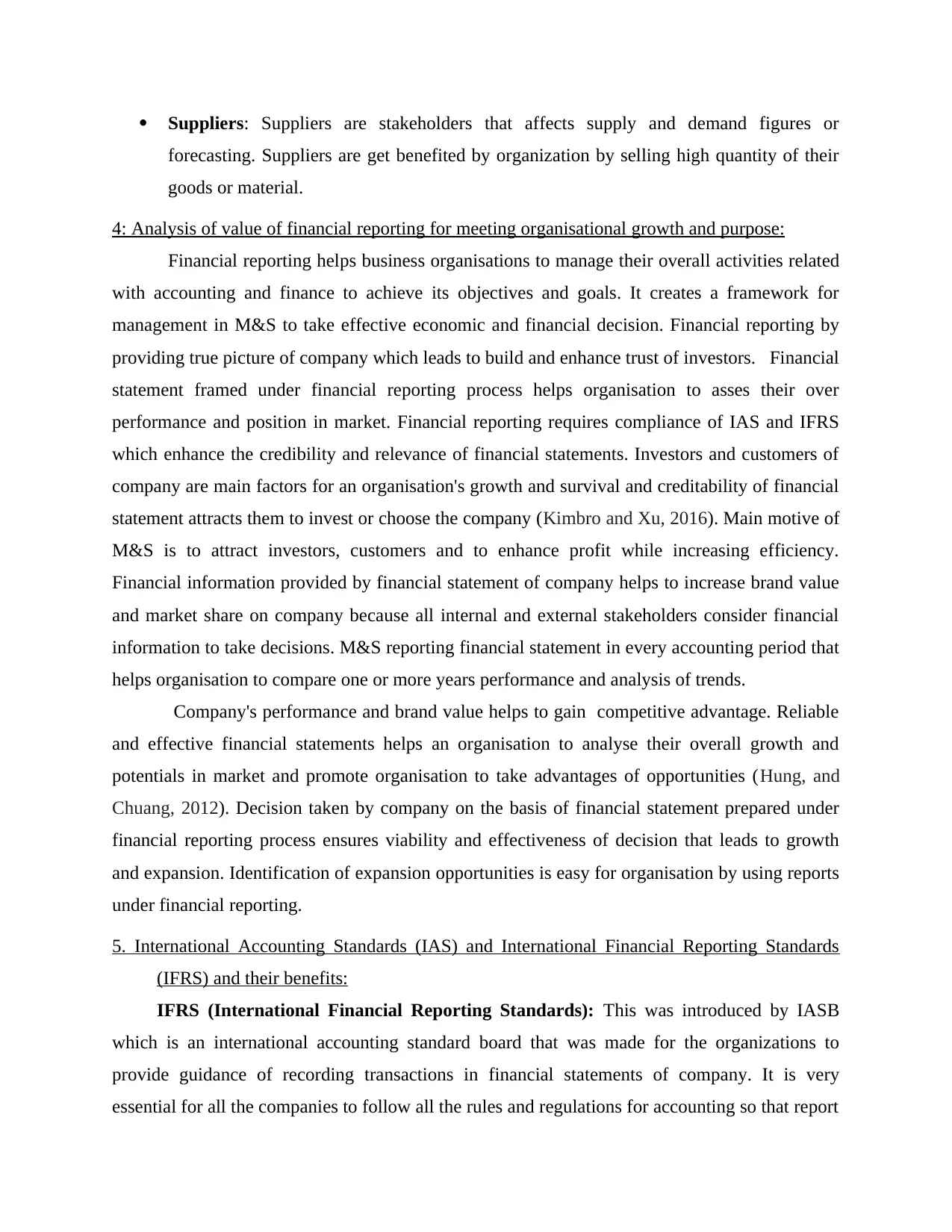
Suppliers: Suppliers are stakeholders that affects supply and demand figures or
forecasting. Suppliers are get benefited by organization by selling high quantity of their
goods or material.
4: Analysis of value of financial reporting for meeting organisational growth and purpose:
Financial reporting helps business organisations to manage their overall activities related
with accounting and finance to achieve its objectives and goals. It creates a framework for
management in M&S to take effective economic and financial decision. Financial reporting by
providing true picture of company which leads to build and enhance trust of investors. Financial
statement framed under financial reporting process helps organisation to asses their over
performance and position in market. Financial reporting requires compliance of IAS and IFRS
which enhance the credibility and relevance of financial statements. Investors and customers of
company are main factors for an organisation's growth and survival and creditability of financial
statement attracts them to invest or choose the company (Kimbro and Xu, 2016). Main motive of
M&S is to attract investors, customers and to enhance profit while increasing efficiency.
Financial information provided by financial statement of company helps to increase brand value
and market share on company because all internal and external stakeholders consider financial
information to take decisions. M&S reporting financial statement in every accounting period that
helps organisation to compare one or more years performance and analysis of trends.
Company's performance and brand value helps to gain competitive advantage. Reliable
and effective financial statements helps an organisation to analyse their overall growth and
potentials in market and promote organisation to take advantages of opportunities (Hung, and
Chuang, 2012). Decision taken by company on the basis of financial statement prepared under
financial reporting process ensures viability and effectiveness of decision that leads to growth
and expansion. Identification of expansion opportunities is easy for organisation by using reports
under financial reporting.
5. International Accounting Standards (IAS) and International Financial Reporting Standards
(IFRS) and their benefits:
IFRS (International Financial Reporting Standards): This was introduced by IASB
which is an international accounting standard board that was made for the organizations to
provide guidance of recording transactions in financial statements of company. It is very
essential for all the companies to follow all the rules and regulations for accounting so that report
forecasting. Suppliers are get benefited by organization by selling high quantity of their
goods or material.
4: Analysis of value of financial reporting for meeting organisational growth and purpose:
Financial reporting helps business organisations to manage their overall activities related
with accounting and finance to achieve its objectives and goals. It creates a framework for
management in M&S to take effective economic and financial decision. Financial reporting by
providing true picture of company which leads to build and enhance trust of investors. Financial
statement framed under financial reporting process helps organisation to asses their over
performance and position in market. Financial reporting requires compliance of IAS and IFRS
which enhance the credibility and relevance of financial statements. Investors and customers of
company are main factors for an organisation's growth and survival and creditability of financial
statement attracts them to invest or choose the company (Kimbro and Xu, 2016). Main motive of
M&S is to attract investors, customers and to enhance profit while increasing efficiency.
Financial information provided by financial statement of company helps to increase brand value
and market share on company because all internal and external stakeholders consider financial
information to take decisions. M&S reporting financial statement in every accounting period that
helps organisation to compare one or more years performance and analysis of trends.
Company's performance and brand value helps to gain competitive advantage. Reliable
and effective financial statements helps an organisation to analyse their overall growth and
potentials in market and promote organisation to take advantages of opportunities (Hung, and
Chuang, 2012). Decision taken by company on the basis of financial statement prepared under
financial reporting process ensures viability and effectiveness of decision that leads to growth
and expansion. Identification of expansion opportunities is easy for organisation by using reports
under financial reporting.
5. International Accounting Standards (IAS) and International Financial Reporting Standards
(IFRS) and their benefits:
IFRS (International Financial Reporting Standards): This was introduced by IASB
which is an international accounting standard board that was made for the organizations to
provide guidance of recording transactions in financial statements of company. It is very
essential for all the companies to follow all the rules and regulations for accounting so that report
Paraphrase This Document
Need a fresh take? Get an instant paraphrase of this document with our AI Paraphraser
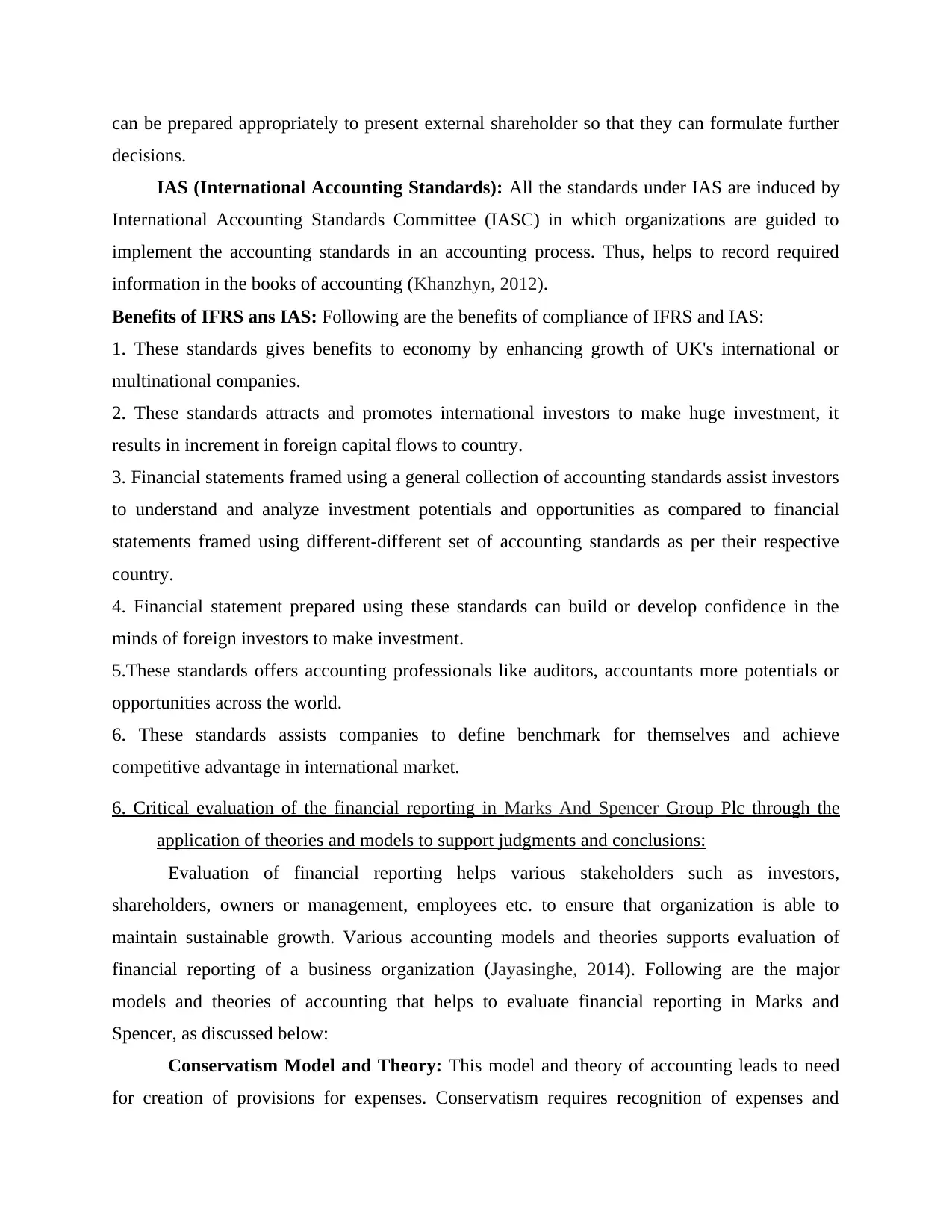
can be prepared appropriately to present external shareholder so that they can formulate further
decisions.
IAS (International Accounting Standards): All the standards under IAS are induced by
International Accounting Standards Committee (IASC) in which organizations are guided to
implement the accounting standards in an accounting process. Thus, helps to record required
information in the books of accounting (Khanzhyn, 2012).
Benefits of IFRS ans IAS: Following are the benefits of compliance of IFRS and IAS:
1. These standards gives benefits to economy by enhancing growth of UK's international or
multinational companies.
2. These standards attracts and promotes international investors to make huge investment, it
results in increment in foreign capital flows to country.
3. Financial statements framed using a general collection of accounting standards assist investors
to understand and analyze investment potentials and opportunities as compared to financial
statements framed using different-different set of accounting standards as per their respective
country.
4. Financial statement prepared using these standards can build or develop confidence in the
minds of foreign investors to make investment.
5.These standards offers accounting professionals like auditors, accountants more potentials or
opportunities across the world.
6. These standards assists companies to define benchmark for themselves and achieve
competitive advantage in international market.
6. Critical evaluation of the financial reporting in Marks And Spencer Group Plc through the
application of theories and models to support judgments and conclusions:
Evaluation of financial reporting helps various stakeholders such as investors,
shareholders, owners or management, employees etc. to ensure that organization is able to
maintain sustainable growth. Various accounting models and theories supports evaluation of
financial reporting of a business organization (Jayasinghe, 2014). Following are the major
models and theories of accounting that helps to evaluate financial reporting in Marks and
Spencer, as discussed below:
Conservatism Model and Theory: This model and theory of accounting leads to need
for creation of provisions for expenses. Conservatism requires recognition of expenses and
decisions.
IAS (International Accounting Standards): All the standards under IAS are induced by
International Accounting Standards Committee (IASC) in which organizations are guided to
implement the accounting standards in an accounting process. Thus, helps to record required
information in the books of accounting (Khanzhyn, 2012).
Benefits of IFRS ans IAS: Following are the benefits of compliance of IFRS and IAS:
1. These standards gives benefits to economy by enhancing growth of UK's international or
multinational companies.
2. These standards attracts and promotes international investors to make huge investment, it
results in increment in foreign capital flows to country.
3. Financial statements framed using a general collection of accounting standards assist investors
to understand and analyze investment potentials and opportunities as compared to financial
statements framed using different-different set of accounting standards as per their respective
country.
4. Financial statement prepared using these standards can build or develop confidence in the
minds of foreign investors to make investment.
5.These standards offers accounting professionals like auditors, accountants more potentials or
opportunities across the world.
6. These standards assists companies to define benchmark for themselves and achieve
competitive advantage in international market.
6. Critical evaluation of the financial reporting in Marks And Spencer Group Plc through the
application of theories and models to support judgments and conclusions:
Evaluation of financial reporting helps various stakeholders such as investors,
shareholders, owners or management, employees etc. to ensure that organization is able to
maintain sustainable growth. Various accounting models and theories supports evaluation of
financial reporting of a business organization (Jayasinghe, 2014). Following are the major
models and theories of accounting that helps to evaluate financial reporting in Marks and
Spencer, as discussed below:
Conservatism Model and Theory: This model and theory of accounting leads to need
for creation of provisions for expenses. Conservatism requires recognition of expenses and
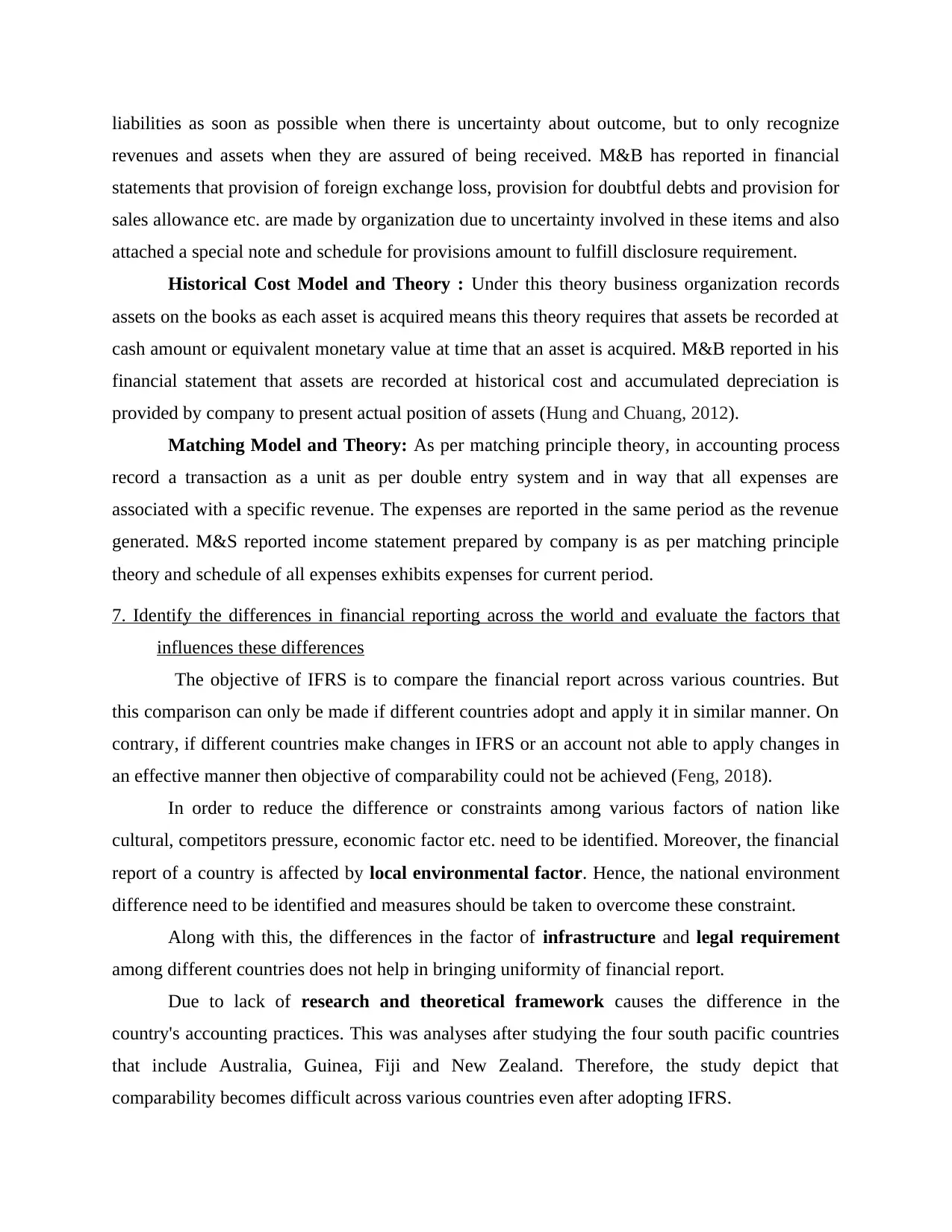
liabilities as soon as possible when there is uncertainty about outcome, but to only recognize
revenues and assets when they are assured of being received. M&B has reported in financial
statements that provision of foreign exchange loss, provision for doubtful debts and provision for
sales allowance etc. are made by organization due to uncertainty involved in these items and also
attached a special note and schedule for provisions amount to fulfill disclosure requirement.
Historical Cost Model and Theory : Under this theory business organization records
assets on the books as each asset is acquired means this theory requires that assets be recorded at
cash amount or equivalent monetary value at time that an asset is acquired. M&B reported in his
financial statement that assets are recorded at historical cost and accumulated depreciation is
provided by company to present actual position of assets (Hung and Chuang, 2012).
Matching Model and Theory: As per matching principle theory, in accounting process
record a transaction as a unit as per double entry system and in way that all expenses are
associated with a specific revenue. The expenses are reported in the same period as the revenue
generated. M&S reported income statement prepared by company is as per matching principle
theory and schedule of all expenses exhibits expenses for current period.
7. Identify the differences in financial reporting across the world and evaluate the factors that
influences these differences
The objective of IFRS is to compare the financial report across various countries. But
this comparison can only be made if different countries adopt and apply it in similar manner. On
contrary, if different countries make changes in IFRS or an account not able to apply changes in
an effective manner then objective of comparability could not be achieved (Feng, 2018).
In order to reduce the difference or constraints among various factors of nation like
cultural, competitors pressure, economic factor etc. need to be identified. Moreover, the financial
report of a country is affected by local environmental factor. Hence, the national environment
difference need to be identified and measures should be taken to overcome these constraint.
Along with this, the differences in the factor of infrastructure and legal requirement
among different countries does not help in bringing uniformity of financial report.
Due to lack of research and theoretical framework causes the difference in the
country's accounting practices. This was analyses after studying the four south pacific countries
that include Australia, Guinea, Fiji and New Zealand. Therefore, the study depict that
comparability becomes difficult across various countries even after adopting IFRS.
revenues and assets when they are assured of being received. M&B has reported in financial
statements that provision of foreign exchange loss, provision for doubtful debts and provision for
sales allowance etc. are made by organization due to uncertainty involved in these items and also
attached a special note and schedule for provisions amount to fulfill disclosure requirement.
Historical Cost Model and Theory : Under this theory business organization records
assets on the books as each asset is acquired means this theory requires that assets be recorded at
cash amount or equivalent monetary value at time that an asset is acquired. M&B reported in his
financial statement that assets are recorded at historical cost and accumulated depreciation is
provided by company to present actual position of assets (Hung and Chuang, 2012).
Matching Model and Theory: As per matching principle theory, in accounting process
record a transaction as a unit as per double entry system and in way that all expenses are
associated with a specific revenue. The expenses are reported in the same period as the revenue
generated. M&S reported income statement prepared by company is as per matching principle
theory and schedule of all expenses exhibits expenses for current period.
7. Identify the differences in financial reporting across the world and evaluate the factors that
influences these differences
The objective of IFRS is to compare the financial report across various countries. But
this comparison can only be made if different countries adopt and apply it in similar manner. On
contrary, if different countries make changes in IFRS or an account not able to apply changes in
an effective manner then objective of comparability could not be achieved (Feng, 2018).
In order to reduce the difference or constraints among various factors of nation like
cultural, competitors pressure, economic factor etc. need to be identified. Moreover, the financial
report of a country is affected by local environmental factor. Hence, the national environment
difference need to be identified and measures should be taken to overcome these constraint.
Along with this, the differences in the factor of infrastructure and legal requirement
among different countries does not help in bringing uniformity of financial report.
Due to lack of research and theoretical framework causes the difference in the
country's accounting practices. This was analyses after studying the four south pacific countries
that include Australia, Guinea, Fiji and New Zealand. Therefore, the study depict that
comparability becomes difficult across various countries even after adopting IFRS.
⊘ This is a preview!⊘
Do you want full access?
Subscribe today to unlock all pages.

Trusted by 1+ million students worldwide
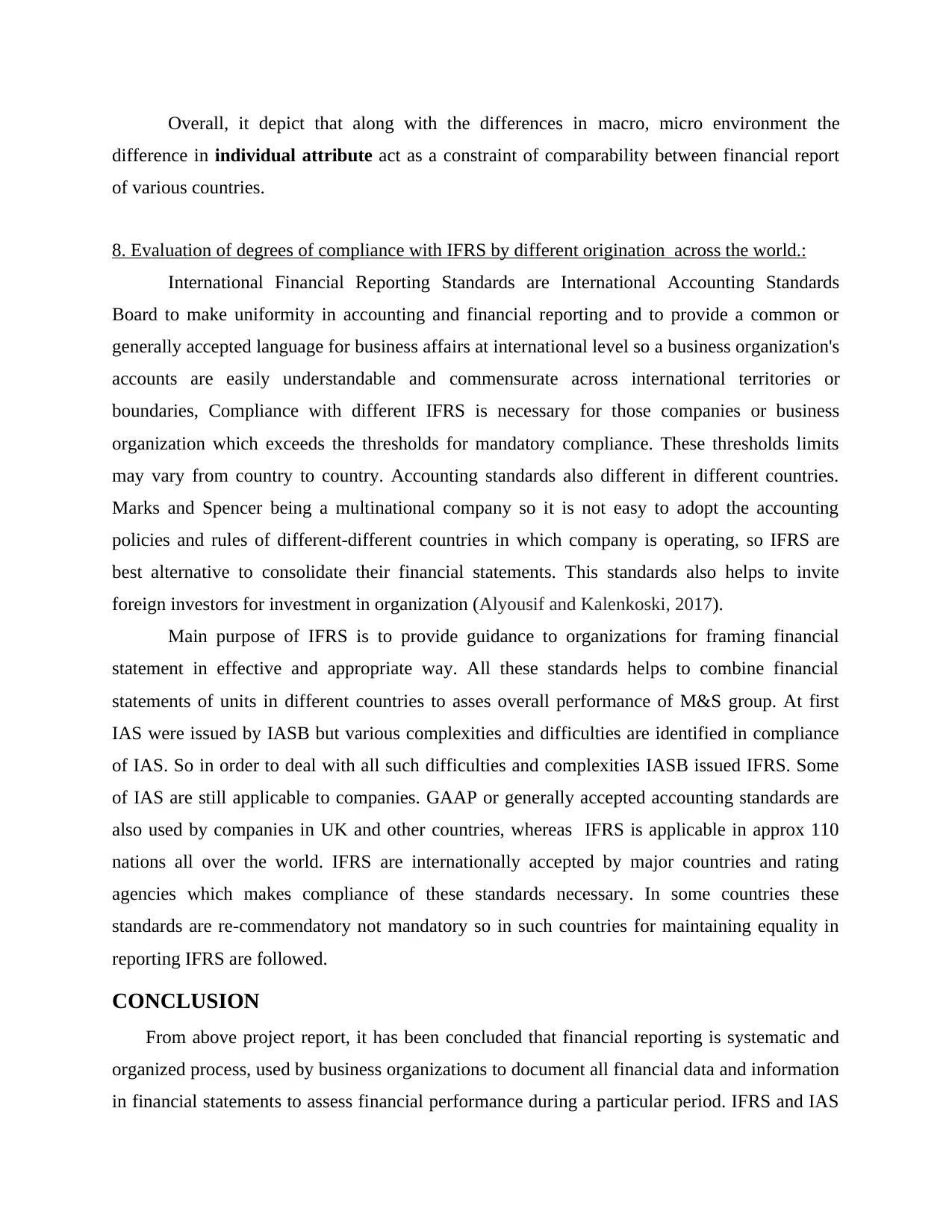
Overall, it depict that along with the differences in macro, micro environment the
difference in individual attribute act as a constraint of comparability between financial report
of various countries.
8. Evaluation of degrees of compliance with IFRS by different origination across the world.:
International Financial Reporting Standards are International Accounting Standards
Board to make uniformity in accounting and financial reporting and to provide a common or
generally accepted language for business affairs at international level so a business organization's
accounts are easily understandable and commensurate across international territories or
boundaries, Compliance with different IFRS is necessary for those companies or business
organization which exceeds the thresholds for mandatory compliance. These thresholds limits
may vary from country to country. Accounting standards also different in different countries.
Marks and Spencer being a multinational company so it is not easy to adopt the accounting
policies and rules of different-different countries in which company is operating, so IFRS are
best alternative to consolidate their financial statements. This standards also helps to invite
foreign investors for investment in organization (Alyousif and Kalenkoski, 2017).
Main purpose of IFRS is to provide guidance to organizations for framing financial
statement in effective and appropriate way. All these standards helps to combine financial
statements of units in different countries to asses overall performance of M&S group. At first
IAS were issued by IASB but various complexities and difficulties are identified in compliance
of IAS. So in order to deal with all such difficulties and complexities IASB issued IFRS. Some
of IAS are still applicable to companies. GAAP or generally accepted accounting standards are
also used by companies in UK and other countries, whereas IFRS is applicable in approx 110
nations all over the world. IFRS are internationally accepted by major countries and rating
agencies which makes compliance of these standards necessary. In some countries these
standards are re-commendatory not mandatory so in such countries for maintaining equality in
reporting IFRS are followed.
CONCLUSION
From above project report, it has been concluded that financial reporting is systematic and
organized process, used by business organizations to document all financial data and information
in financial statements to assess financial performance during a particular period. IFRS and IAS
difference in individual attribute act as a constraint of comparability between financial report
of various countries.
8. Evaluation of degrees of compliance with IFRS by different origination across the world.:
International Financial Reporting Standards are International Accounting Standards
Board to make uniformity in accounting and financial reporting and to provide a common or
generally accepted language for business affairs at international level so a business organization's
accounts are easily understandable and commensurate across international territories or
boundaries, Compliance with different IFRS is necessary for those companies or business
organization which exceeds the thresholds for mandatory compliance. These thresholds limits
may vary from country to country. Accounting standards also different in different countries.
Marks and Spencer being a multinational company so it is not easy to adopt the accounting
policies and rules of different-different countries in which company is operating, so IFRS are
best alternative to consolidate their financial statements. This standards also helps to invite
foreign investors for investment in organization (Alyousif and Kalenkoski, 2017).
Main purpose of IFRS is to provide guidance to organizations for framing financial
statement in effective and appropriate way. All these standards helps to combine financial
statements of units in different countries to asses overall performance of M&S group. At first
IAS were issued by IASB but various complexities and difficulties are identified in compliance
of IAS. So in order to deal with all such difficulties and complexities IASB issued IFRS. Some
of IAS are still applicable to companies. GAAP or generally accepted accounting standards are
also used by companies in UK and other countries, whereas IFRS is applicable in approx 110
nations all over the world. IFRS are internationally accepted by major countries and rating
agencies which makes compliance of these standards necessary. In some countries these
standards are re-commendatory not mandatory so in such countries for maintaining equality in
reporting IFRS are followed.
CONCLUSION
From above project report, it has been concluded that financial reporting is systematic and
organized process, used by business organizations to document all financial data and information
in financial statements to assess financial performance during a particular period. IFRS and IAS
Paraphrase This Document
Need a fresh take? Get an instant paraphrase of this document with our AI Paraphraser
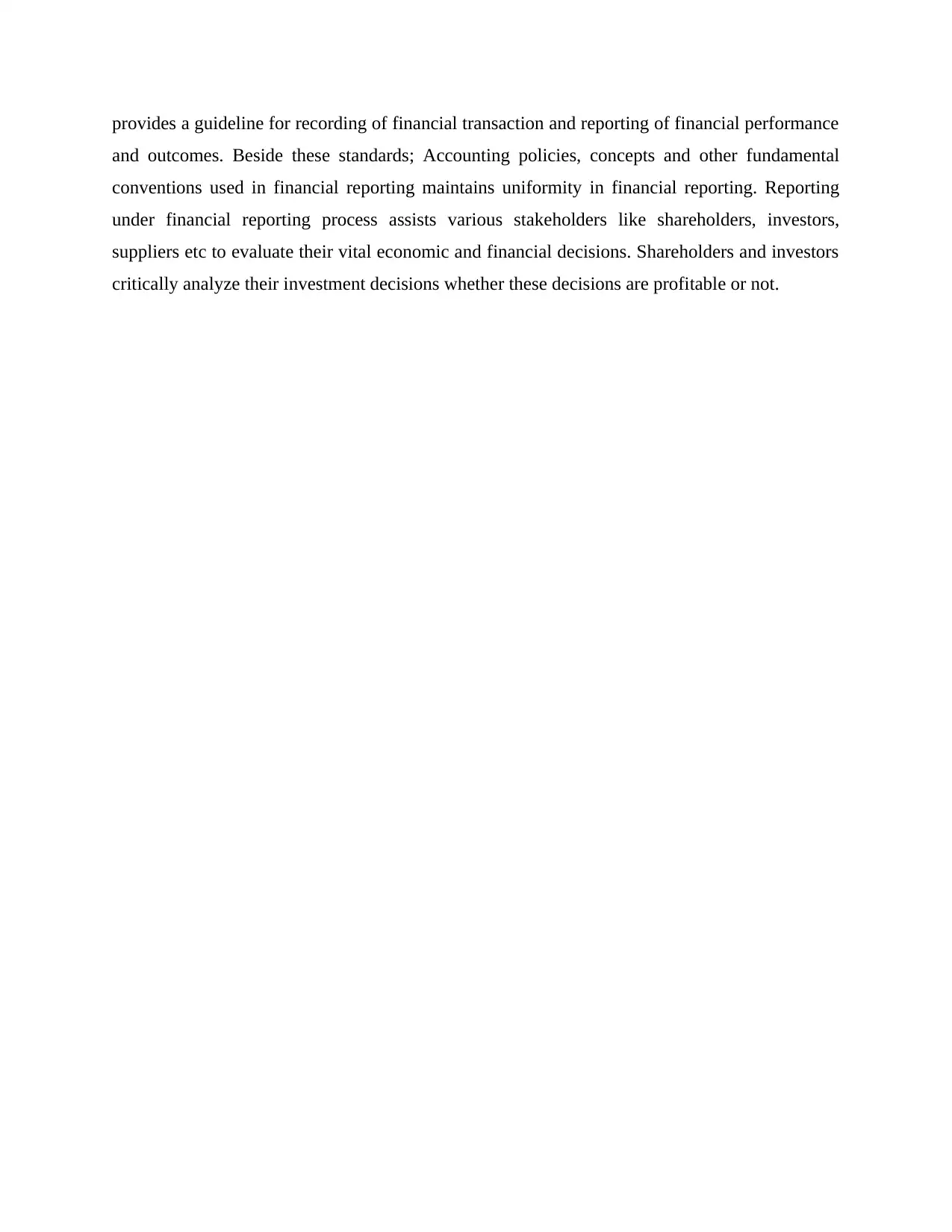
provides a guideline for recording of financial transaction and reporting of financial performance
and outcomes. Beside these standards; Accounting policies, concepts and other fundamental
conventions used in financial reporting maintains uniformity in financial reporting. Reporting
under financial reporting process assists various stakeholders like shareholders, investors,
suppliers etc to evaluate their vital economic and financial decisions. Shareholders and investors
critically analyze their investment decisions whether these decisions are profitable or not.
and outcomes. Beside these standards; Accounting policies, concepts and other fundamental
conventions used in financial reporting maintains uniformity in financial reporting. Reporting
under financial reporting process assists various stakeholders like shareholders, investors,
suppliers etc to evaluate their vital economic and financial decisions. Shareholders and investors
critically analyze their investment decisions whether these decisions are profitable or not.
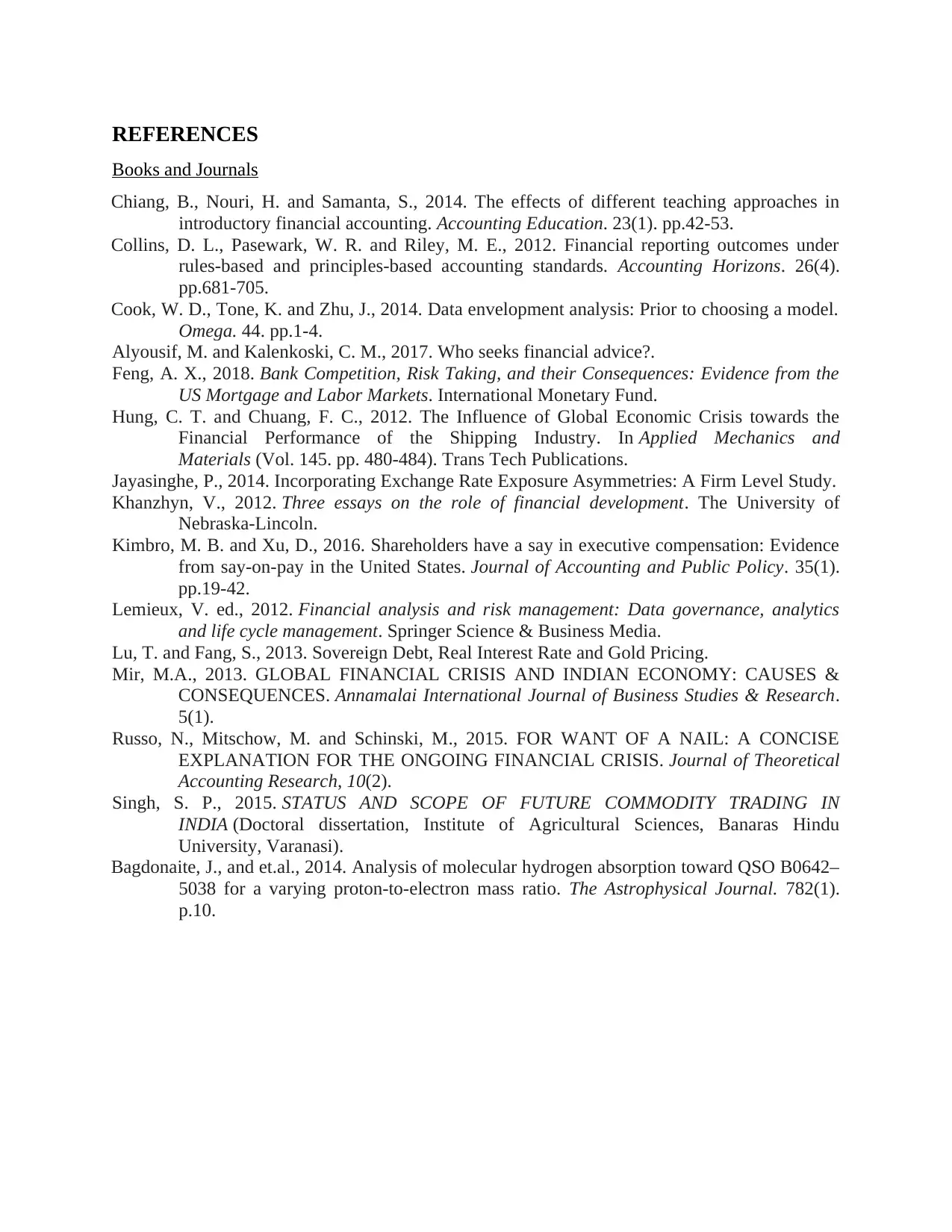
REFERENCES
Books and Journals
Chiang, B., Nouri, H. and Samanta, S., 2014. The effects of different teaching approaches in
introductory financial accounting. Accounting Education. 23(1). pp.42-53.
Collins, D. L., Pasewark, W. R. and Riley, M. E., 2012. Financial reporting outcomes under
rules-based and principles-based accounting standards. Accounting Horizons. 26(4).
pp.681-705.
Cook, W. D., Tone, K. and Zhu, J., 2014. Data envelopment analysis: Prior to choosing a model.
Omega. 44. pp.1-4.
Alyousif, M. and Kalenkoski, C. M., 2017. Who seeks financial advice?.
Feng, A. X., 2018. Bank Competition, Risk Taking, and their Consequences: Evidence from the
US Mortgage and Labor Markets. International Monetary Fund.
Hung, C. T. and Chuang, F. C., 2012. The Influence of Global Economic Crisis towards the
Financial Performance of the Shipping Industry. In Applied Mechanics and
Materials (Vol. 145. pp. 480-484). Trans Tech Publications.
Jayasinghe, P., 2014. Incorporating Exchange Rate Exposure Asymmetries: A Firm Level Study.
Khanzhyn, V., 2012. Three essays on the role of financial development. The University of
Nebraska-Lincoln.
Kimbro, M. B. and Xu, D., 2016. Shareholders have a say in executive compensation: Evidence
from say-on-pay in the United States. Journal of Accounting and Public Policy. 35(1).
pp.19-42.
Lemieux, V. ed., 2012. Financial analysis and risk management: Data governance, analytics
and life cycle management. Springer Science & Business Media.
Lu, T. and Fang, S., 2013. Sovereign Debt, Real Interest Rate and Gold Pricing.
Mir, M.A., 2013. GLOBAL FINANCIAL CRISIS AND INDIAN ECONOMY: CAUSES &
CONSEQUENCES. Annamalai International Journal of Business Studies & Research.
5(1).
Russo, N., Mitschow, M. and Schinski, M., 2015. FOR WANT OF A NAIL: A CONCISE
EXPLANATION FOR THE ONGOING FINANCIAL CRISIS. Journal of Theoretical
Accounting Research, 10(2).
Singh, S. P., 2015. STATUS AND SCOPE OF FUTURE COMMODITY TRADING IN
INDIA (Doctoral dissertation, Institute of Agricultural Sciences, Banaras Hindu
University, Varanasi).
Bagdonaite, J., and et.al., 2014. Analysis of molecular hydrogen absorption toward QSO B0642–
5038 for a varying proton-to-electron mass ratio. The Astrophysical Journal. 782(1).
p.10.
Books and Journals
Chiang, B., Nouri, H. and Samanta, S., 2014. The effects of different teaching approaches in
introductory financial accounting. Accounting Education. 23(1). pp.42-53.
Collins, D. L., Pasewark, W. R. and Riley, M. E., 2012. Financial reporting outcomes under
rules-based and principles-based accounting standards. Accounting Horizons. 26(4).
pp.681-705.
Cook, W. D., Tone, K. and Zhu, J., 2014. Data envelopment analysis: Prior to choosing a model.
Omega. 44. pp.1-4.
Alyousif, M. and Kalenkoski, C. M., 2017. Who seeks financial advice?.
Feng, A. X., 2018. Bank Competition, Risk Taking, and their Consequences: Evidence from the
US Mortgage and Labor Markets. International Monetary Fund.
Hung, C. T. and Chuang, F. C., 2012. The Influence of Global Economic Crisis towards the
Financial Performance of the Shipping Industry. In Applied Mechanics and
Materials (Vol. 145. pp. 480-484). Trans Tech Publications.
Jayasinghe, P., 2014. Incorporating Exchange Rate Exposure Asymmetries: A Firm Level Study.
Khanzhyn, V., 2012. Three essays on the role of financial development. The University of
Nebraska-Lincoln.
Kimbro, M. B. and Xu, D., 2016. Shareholders have a say in executive compensation: Evidence
from say-on-pay in the United States. Journal of Accounting and Public Policy. 35(1).
pp.19-42.
Lemieux, V. ed., 2012. Financial analysis and risk management: Data governance, analytics
and life cycle management. Springer Science & Business Media.
Lu, T. and Fang, S., 2013. Sovereign Debt, Real Interest Rate and Gold Pricing.
Mir, M.A., 2013. GLOBAL FINANCIAL CRISIS AND INDIAN ECONOMY: CAUSES &
CONSEQUENCES. Annamalai International Journal of Business Studies & Research.
5(1).
Russo, N., Mitschow, M. and Schinski, M., 2015. FOR WANT OF A NAIL: A CONCISE
EXPLANATION FOR THE ONGOING FINANCIAL CRISIS. Journal of Theoretical
Accounting Research, 10(2).
Singh, S. P., 2015. STATUS AND SCOPE OF FUTURE COMMODITY TRADING IN
INDIA (Doctoral dissertation, Institute of Agricultural Sciences, Banaras Hindu
University, Varanasi).
Bagdonaite, J., and et.al., 2014. Analysis of molecular hydrogen absorption toward QSO B0642–
5038 for a varying proton-to-electron mass ratio. The Astrophysical Journal. 782(1).
p.10.
⊘ This is a preview!⊘
Do you want full access?
Subscribe today to unlock all pages.

Trusted by 1+ million students worldwide
1 out of 12
Related Documents
Your All-in-One AI-Powered Toolkit for Academic Success.
+13062052269
info@desklib.com
Available 24*7 on WhatsApp / Email
![[object Object]](/_next/static/media/star-bottom.7253800d.svg)
Unlock your academic potential
Copyright © 2020–2026 A2Z Services. All Rights Reserved. Developed and managed by ZUCOL.





